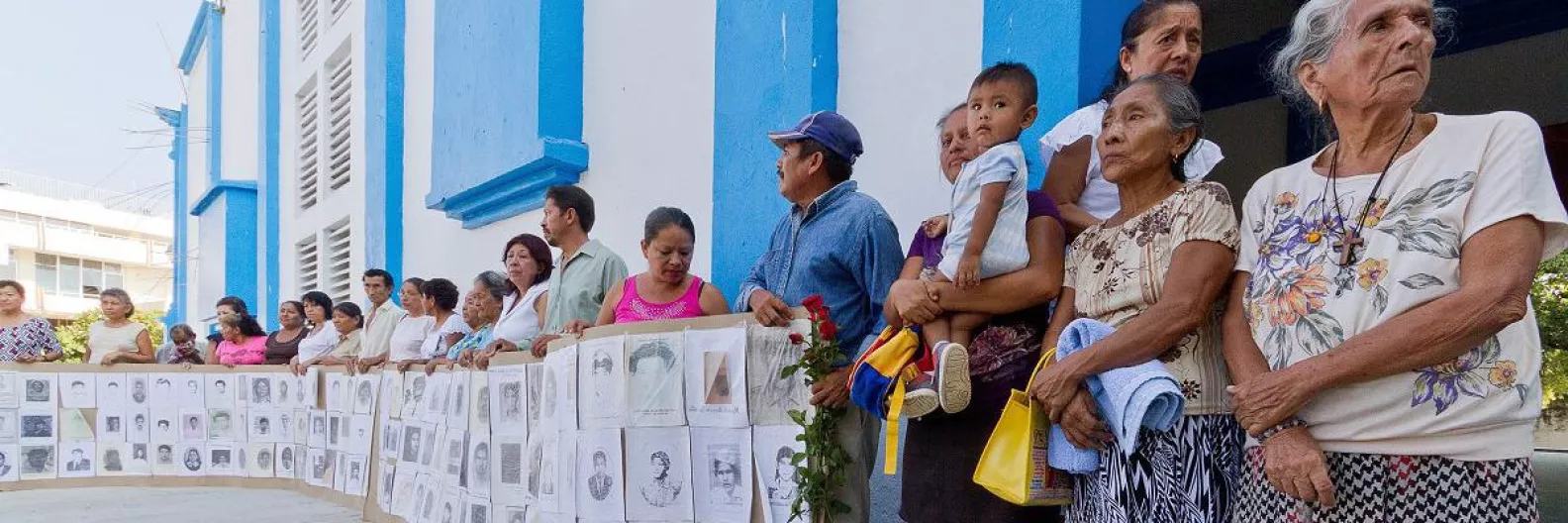

The Mexico Project opened in 1998. Requests for an international presence had initially been received from organizations in Chiapas following the Zapatista uprising in 1994, but PBI began work in the states of Oaxaca and Guerrero, where the presence of international organizations was much more limited. In Guerrero, we first accompanied “The Voice for Those Without a Voice” Human Rights Committee, which had launched the conversation on human rights issues in Mexico. Since then, we have accompanied numerous organizations in Guerrero and several organizations in Oaxaca and Mexico City.
PBI has received requests for accompaniment from human rights defenders in various states of the republic since the organization arrived in Mexico. However, it was in 2009 with the outbreak of violence in the country – especially in relation to the “war against drug trafficking” - that organizations from more states began to request the assistance of PBI, asking for international presence and accompaniment. After a careful analysis was carried out in 2012, PBI decided to open a permanent team of volunteers to accompany organizations in the northern border states of Chihuahua and Coahuila.
The conflicts in Mexico are complex and long lasting, and there are profound social and regional inequalities. Many of these conflicts are due to disputes over land and natural resources, often involving multinational companies and state-sponsored businesses. Over the last few years we have been following cases before the Inter-American Court of Human Rights (IACHR), including those of Inés Fernández Ortega and Valentina Rosendo Cantú, indigenous Me`phaa women who were raped and tortured by Mexican soldiers in 2002. Before the courts it was argued that these women’s cases demonstrated endemic problems in Mexico, such as the lack of access to justice for female victims of violence, abuses due to the lack of public control over the Mexican army and the systematic persecution of those who organise themselves to defend indigenous rights.
In late 2017, PBI and nine other organizations combined efforts to form an International Observatory in Mexico, partly in response to the Internal Security Law passed by Mexico's Senate, which dangerously increases the role and authorities of armed forces in civil matters.
The Mexico project has 13 volunteers accompanying human rights organizations in Guerrero and Oaxaca, as well as a field team and office in Chihuahua and a coordination office in Mexico City.
Visit the Mexico Project's website
See news and articles related to Mexico
Who We Protect in Mexico
In Mexico City
In Mexico City, PBI maintains continuous dialogue with federal and state authorities located in the Federal District, as well as with the diplomatic corps, the UN Office of the High Commissioner for Human Rights, and the Delegation of the European Commission. PBI also meets with governmental and non-governmental delegations that visit Mexico who have a specific interest in gaining a better understanding of the human rights situation in Mexico from the perspective of PBI's international accompaniment work.
Emiliana, Alejandro, and Francisco Cerezo Contreras, members of the Cerezo Committee
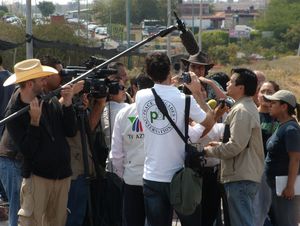
Following the detention of their three brothers Alejandro, Hector and Antonio in August 2001, Francisco and Emiliana Cerezo began to fight for their freedom and soon became victims of harassment and threats. PBI began to accompany Emiliana, Francisco, and Alejandro Cerezo Contreras, members of the Cerezo Committee in February 2002 at the request of the Mexican League for the Defense of Human Rights (Limeddh). The Cerezo Committee continues to work on behalf of other political prisoners in Mexico.
Emiliana Cerezo Contreras states that the amount of harassment has decreased since they have been receiving international accompaniment: "This is one of the reasons that we went to PBI: since it is an international organization that has a support network in other countries, we find that it is difficult for the Mexican government to make an attempt against us without having to pay a high price in the eyes of the international community that is watching the human rights situation in Mexico. I think that this is the importance of PBI."
Alejandro Cerezo was exonerated of all charges and freed in March 2005, and on February 16, 2009 Héctor and Antonio Cerezo were freed from prison, after having completed their sentence. PBI accompanied Francisco, Alejandro and Emiliana Cerezo during the liberation of their brothers.
In Guerrero
Organization of the Indigenous Me'Phaa People
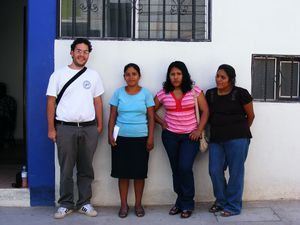
At the request of the Tlachinollan Human Rights Center, Peace Brigades International has accompanied Obtilia Eugenio Manuel, Andrea Eugenio Manuel, Cuauhtemoc Ramirez Rodriguez, Ines Ortega, and Valentina Cantu--members of the Organization of the Indigenous Me'Phaa People (OPIM)--since February 2005 in Ayutla de los Libres, Guerrero and in the nearby communities of Barranca de Guadalupe, El Camalote, and Barranca de Tecuani. The OPIM was founded in 1998 by Obtilia Eugenio Manuel and Cuauhtémoc Ramírez Rodríguez. The organization has been committed to the defense and promotion of indigenous people's rights in the Costa Chica region of Guerrero.
The accompaniment began following a series of death threats to Obtilia Eugenio Manuel shortly after she denounced the militarization in the region. Members of the OPIM continue to be victims of threats, harassment, and incarceration. Five members of the OPIM were adopted by Amnesty International as prisoners of conscience. Four of them were released but Raul Hernández is still detained. Among the agressions against members of this organization, the raping of the Me’phaa indigenous women Valentina Rosendo Cantu and Ines Ortega Fernandez in 2002 stand out. Currently, the Inter-American Court of Human Rights (IACHR) is analyzing their cases.
With the special bulletin, Silenced: Violence against Human Rights Defenders in the South of Mexico, PBI intends to provide information regarding the particularly difficult situation faced by the OPIM's members and others human rights defenders in Ayutla.
Tlachinollan Human Rights Center
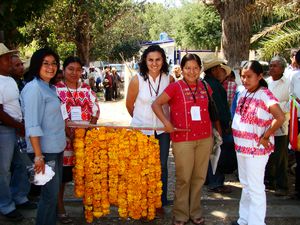
The Tlachinollan Human Rights Center is located in Tlapa and Ayutla, Guerrero, and focuses on the indigenous municipalities located in the Montaña and Costa Chica regions of Guerrero. About 300,000 residents of the 600 communities in this region belong to the Mixtec, Nahua, and Tlapanec indigenous groups. This indigenous region is highly marginalized and is among the poorest in Mexico. Given the serious human rights violations in the region, Tlachinollan works to defend the rights of these indigenous groups. PBI has accompanied Tlachinollan since December 2003.
See the interview with Alejandra González Marín, psychologist from the Tlachinollan Human Rights Center.
Civil Monitor of Police and Security Forces of the Montaña, Guerrero
The Civil Monitor is a non-governmental organization based in Tlapa de Comonfort and founded in 2008 by the Tlachinollan Human Rights Center, the Institute for Security and Democracy (INSYDE), and Fundar, a Center for Analysis and Investigation. The goal of their work is to work toward a respect for fundamental rights in the actions of the police and army units in the state of Guerrero, especially in the Montaña region. In order to do this, the Civil Monitor documents individual reports of abuse, and works to identify good and bad practices by police and security forces. PBI began accompanying the Civil Monitor in June 2009.
Tita Radilla, Vice President of AFADEM in Atoyac

The PBI Mexico team began to provide accompaniment to Tita Radilla, vice-president of the Association of Relatives of the Detained, Disappeared, and Victims of Human Rights Abuses in Mexico (AFADEM) in August 2003. This organization belongs to the Latin American Federation of Associations for Relatives of the Detained-Disappeared (FEDEFAM). AFADEM, together with the Mexican Commission for the Promotion and Defense of Human Rights (CMDPDH), has filed complaints against the Mexican government with the Inter-American Commission on Human Rights (IACHR) for the forced disappearance of Tita's father, Rosendo Radilla Pacheco.
On Tuesday 15th of December, 2009 the IACHR published its sentence against the Mexican State in the case of Rosendo Radilla, disappeared after being detained in a military road block in Atoyac de Alvarez, Guerrero, in August 1974. You can learn more about the sentence and the case in PBI Mexico's 2016 Report.
Watch Radilla Case: An Open Wound from Mexico's Dirty War on You Tube.
Organization of Women Ecologists of the Sierra de Petatlán (OMESP)
At the request of SOS Bahia and the Tlachinollan Human Rights Center, the PBI Mexico Team began to offer international accompaniment to the Organization of Women Ecologists of the Sierra de Petatlán, A.C. (OMESP) in August 2005.
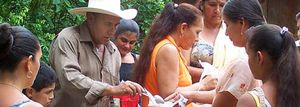
In 2000, Celsa Valdovinos and her husband Felipe Arreaga founded OMESP. The organization now has over 80 active members and promotes productive projects and reforestation. For many years, Celsa Valdovinos and Felipe Arreaga have been noted for their work to protect the forests in the region.
On March 2, 2005, Felipe Arreaga was declared a prisoner of conscience by Amnesty International for "facing an unjust trial." After spending 10 months in the local prison in Zihuatanejo, he was absolved of the charges against him and liberated on September 15, 2005. Felipe’s peaceful struggle to prevent excessive logging of local forests ended on September 16th, 2009, after being hit by a mini bus. Our most heartfelt condolences to Felipe’s wife, Celsa, and his friends and family.
In Oaxaca
The Integral Defence Committee for Human Rights “Gobixha” (Codigo-DH)
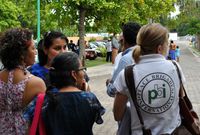
The Integral Defense Committee for Human Rights `Gobixha´ (Codigo-DH) is a civil society organization that offers legal aid as well as psychological support and medical attention to victims of human rights violations, whilst working towards the access to justice and the fight against impunity. Codigo-DH was founded in January 2011, created due to the closure of the November 25 Liberation Committee which had previously been accompanied by PBI since the end of 2009 due to the constant threats and attacks that the staff received for their legitimate work in the defense of human rights. Despite having received precautionary measures from the Inter-American Commission on Human Rights (IACHR) since July 2007, the aggressions against the members of Codigo-DH and their family members have not ceased. For this reason PBI continues to provide international accompaniment to the organization.
In 2011, Codigo-DH opened a regional office in San Pedro Amuzgos, which provides the educational and legal advice that contributes to the recognition of and respect for human rights in the region, the awareness and the education of local authorities and the training of human rights advocates. In 2013 Codigo-DH suffered further attacks when it began to support communities from the Isthmus of Tehuantepec who are demanding their right to free, prior and informed consultation to the apparent imposition of a wind farm. The community human rights defenders in San Dionisio del Mar and Álvaro Obregón have suffered various attacks and threats for their activism in the defense of their lands and territories. PBI is monitoring the security situation and the granting of the right to consultation through its accompaniment to Codigo-DH in the Isthmus.
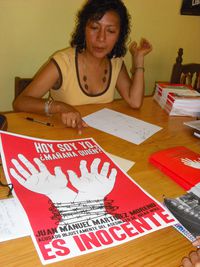
Alba Cruz is the coordinator of the human rights judicial area for Codigo-DH. In spite of the wide recognition of her work both in Mexico and at an international level, the human rights lawyer has been threatened and harassed due to the cases that she has been representing in recent years. Alba is currently taking on the collective denouncement and search for justice of more than 30 former prisoners that were arbitrarily detained, tortured, and sexually abused during the 2006 conflict. She demands justice in the cases of extrajudicial killings of activists committed in 2006 and denounced the arbitrary detention and mistreatment of members of the movement # Yosoy132 in 2012.
Alba has managed some very high cases, including the `Oaxacan Case´, in which the Supreme Court of Justice of the Nation made responsible the then state government for the human rights violations during 2006-2007 in Oaxaca. Alba was also Juan Manuel Moreno´s lawyer, who was released in 2010 after 16 months of wrongful imprisonment for the murder of American photographer Brad Will in 2006. In addition, Alba is the defense lawyer for Marcelino Cooache, who presents one of the emblematic cases of human rights violations in Oaxaca. The union leader was illegally detained and tortured in April 2009, but has still not obtained justice or reparation. Marcelino and his family continue being victims of harassment, threats and attacks despite being beneficiaries of precautionary measures from the IACHR since 2009.
Alba has been victim of constant death threats, aggressions against her and her family, harrassment, and defamation of her work in the promotion of human rights. PBI continues to advocate for the full and consistent implementation of her precautionary measures.
See PBI Mexico's report on Codigo-DH.
Father Alejandro Solalinde Guerra, director of the Hermanos en el Camino migrant shelter
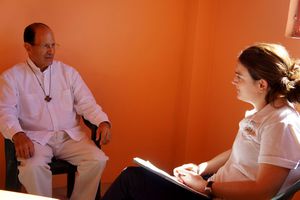
The Catholic priest Father Alejandro Solalinde Guerra and the team at the Hermanos en el Camino migrant shelter in Ciudad Ixtepec offer humanitarian aid and legal assistance to migrants, coming mainly from Central America. In 2010, the National Human Rights Commission (CNDH) registered 11,333 cases of kidnappings of migrants. The grave containing the bodies of 72 migrants, found in 2010 in the state of Tamaulipas, is emblematic of the risks that the migrant population face. Migrant persons rights are limited by the law and often find themselves in a situation of extreme vulnerability to organized crime and government corruption.
The defense of the human rights of migrant persons that Father Solalinde (who won the National Human Rights Prize in 2012) carries out along with his team has been widely recognized both in Mexico and abroad. On the other hand, it has made them a target for attacks, defamation, and death threats. Since 2008, the workers of the shelter have reported numerous cases of corrupt municipal, state, and federal officials, as well as the kidnapping of migrants, which has in turn exposed the shelter to aggressions and intimidation from organized gangs and public officials. Therefore, on the 23 April 2010, the Inter-American Commission on Human Rights granted precautionary measures to Father Solalinde Guerra to assure his life and physical integrity.
Father Solalinde and his colleagues in the Hermanos en el Camino shelter, just like other migrant shelters in the country, continue to suffer death threats. PBI expects the Mexican State to implement the correct means to guarantee the security of those who defend the rights of migrants.
See PBI Mexico's info sheet on and interview with Father Solalinde. Father Solalinde also appears in the Invisibles series of documentaries by Amnesty International and Gael García Bernal.
The “Bartolome Carrasco Briseno” Regional Centre for Human Rights (Barca-DH)
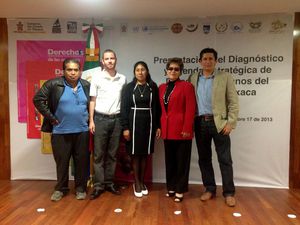
The “Bartolome Carrasco Briseno” Regional Centre for Human Rights (Barca-DH) is a non-governmental human rights organization that was founded from the local church community with the purpose of promoting and defending the human rights of the communities of Oaxaca. In October 2010, PBI accepted the request for international accompaniment with a focus on supporting Minerva Martinez Lazaro, coordinator of Barca-DH, and the priests Martin Octavio Garcia Ortiz and Wilfrido Mayren Pelaez (more commonly known as Father Uvi), who are both board members of the organization.
Since Barca-DH was established in 1992, the NGO has constantly faced surveillance, threats, and defamation campaigns as well as, on various occasions, direct attacks and judicial proceedings against it for its work in the promotion, defense, and education in human rights. Moreover, Barca-DH is leading an international campaign for the release of Alvaro Sebastian Ramirez, prisoner from the Loxicha region, and carrying out other human rights projects with communities in the Sierra Sur and Central Valleys regions of Oaxaca. Barca-DH advises the Zaniza, Teojomulco, and San Lorenzo communities, providing information on the environmental impact and the right to prior, free, and informed consultation regarding the mining project affecting this zone.
The coordinator of Barca-DH, Minerva Martinez Lazaro, has faced numerous risks and threats for the work in these high-profile cases. Father Uvi, a recognized human rights defender in Oaxaca for his work in the pacification of different conflicts, is currently one of the driving forces for the resolution of the conflict affecting the Santiago Amoltepec, Elozochitlán de Flores Magón, and San Lorenzo Texmelucan communities. He has suffered years of harassment, threats, and defamation campaigns, among other abuses, due to his work in the defense of human rights. Father Martin, for his part, has centered his work in supporting the communities of San José del Progreso that are resisting the exploitation of gold and silver from mines owned by the company Cuzcatlan. After a defamation campaign was held against him and having received severe harassment, the priest denounced having been attacked in June 2010. A few days later, he was detained and accused of the killing of two people during a confrontation in San José del Progreso. Subsequently, he was released without charges, but has not received compensation for the abuses and violations that he suffered.
See PBI Mexico's info sheet on Barca-DH.
Services for an Alternative Education A.C. (EDUCA)
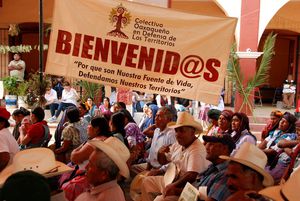
Services for an Alternative Education (EDUCA) is a non-governmental organization founded in 1994 in the Oaxaca City. It encourages democracy and development in Oaxacan communities and promotes justice, equality, and social participation in order to succeed in raising the quality of life of marginalized sectors of the population in Oaxaca. EDUCA advises organizations and indigenous communities to defend their rights as citizens, promotes civic education, empowers indigenous authorities, and pushes for local development projects.
PBI began to accompany EDUCA in August 2013 as a result of the risk faced by community defenders who received advice from the organization in regards to the right to claim prior, free, and informed consultation at the apparent imposition of megaprojects on their lands and territories. The risks are high for those who report inadequate processes of consultation and the negative impacts caused by the extraction and infrastructure projects, not only in Oaxaca, but throughout the country. PBI stresses the importance for the Mexican government to take the right steps to guarantee secure conditions for the legitimate activism of these community defenders.
San José del Progreso and the Coordinator for the United Communities of the Valley of Ocotlán (COPUVO), Magdalena Teitipac, and Paso de la Reina are just some of the cases that EDUCA accompanies and where activists are threatened for the work they carry out. In 2013 EDUCA published the Diagnosis on Attacks of Community Defenders and the Role of Public Human Rights organizations in Oaxaca, whose recommendations must be implemented to ensure the protection of this vulnerable population.
See PBI Mexico's info sheet on EDUCA.
See here for other organizations whose security situation PBI monitors and occasionally supports.
Chihuahua and Coahuila (northern Mexico)
In the last few years PBI Mexico has received more and more requests for international accompaniment from civil society in Mexico. In large part this is due to the context of extreme violence that the country suffers and the increase in aggressions, threats, and harassment against human rights defenders. Due to this new situation, PBI Mexico initiated exploratory missions in 2012 to various states of the Republic, among those Chihuahua, Coahuila, Baja California, Puebla, Tlaxcala, and the Estado de Mexico. Following this exploratory mission, PBI Mexico decided to open a new team in the north of the country, made up of international volunteers, to accompany human rights defenders in the states of Chihuahua and Coahuila. PBI installed a team in Chihuahua City in August 2013.
Chihuahua and Coahuila were identified in our exploratory mission as states with high levels of risk for human rights defenders. This conclusion is backed by a recent report (2013) by the United Nations Office of the High Commissioner for Human Rights, that declares Guerrero, Oaxaca, Chihuahua, Coahuila, and the Federal District as the most dangerous states in the country in which to be a human rights defender.
We emphasize that the themes with which human rights defenders work in these states are emblematic of the situation throughout the country: violations of the rights of migrant persons, disappearances, feminicides, public security, and human rights, among others. For more information see PBI Mexico's publication A Panorama of the Defense of Human Rights in Mexico: Initiatives and Risks of Mexican Civil Society.
Paso Del Norte Human Rights Center
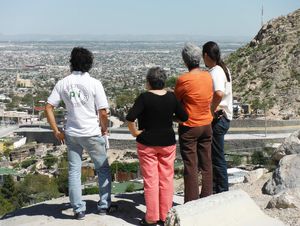
The Paso del Norte Human Rights Center is located in Ciudad Juárez, in the state of Chihuahua, and is run by the priest Óscar Enríquez Pérez. It was founded in 2001 to attend to the defense of human rights in the region and the situation of increasing violence in the city, especially by providing guidance and counseling to the community regarding their civil rights. The context of constant crimes against women, executions, corruption of the public security forces, and a general climate of impunity was hence recognized. The organization has two principle lines of work: one, of accompanying victims, prioritizing cases of torture and forced disappearance; and the other of political advocacy. The cases are handled comprehensively with legal work, communication, and psychological care provided. In addition, the organization also provides specific advice and training workshops, for example, regarding the use of the Istanbul Protocol.
Paso del Norte has been the target of threats and harassment by the federal and state authorities, including a raid on their offices by federal police on 5 June 2011--an incident that resulted in a recommendation from the National Commission for Human Rights (CNDH)--as well as several episodes of surveillance in 2012. The members of the organization are aware that because they work sensitive cases of complaints against members of Mexican security forces, their level of risk is high and they constantly fear reprisals.
This is the first organization accompanied by PBI in the north of the country. The accompaniment began in August 2013. See PBI Mexico's info sheet on Paso del Norte and this video about their history and work.
Saltillo Migrant House

The Saltillo Migrant House (of the Borders With Justice Association), located in the capital of the state of Coahuila, provides humanitarian assistance to hundreds of transmigrants daily. The shelter opened its doors for the first time in 2002. The shelter has a maximum capacity to accommodate 60 people, however, there are times when the shelter has housed up to 316 migrants; it provides support to more than 8000 migrants each year. The humanitarian attention that the shelter offers includes medicine, clothes, food, space to rest, preparation to continue the trip, and psychological support. The migrants who come to the shelter seeking assistance have usually spent from three days to three months traveling through Mexico.
The shelter has developed several institutional strengths, which make it stand out from other shelters in Mexico. More than just humanitarian assistance, the shelter carries out solid work in the defense of migrants' human rights, through the documentation of cases of kidnapping, extortion, abuses, and aggressions experienced by migrants on their way through Mexico. Furthermore, the shelter's departments of documentation, judicial issues, and strategic litigation take care of the lodging of reports concerning the aggressions that the migrants experience.
Nevertheless, the members of the shelter have been victims themselves of harassment, surveillance, and threats due to their work in the field of human rights. Because of its risk situation, the shelter received precautionary measures from the CNDH in 2009 and by the IACHR in 2010. Nonetheless, they have suffered various security incidents over the past few years. PBI's accompaniment to the Saltillo Migrant House was made official in early February 2014. See PBI Mexico's info sheet on Saltillo Migrant House.
Fray Juan de Larios Diocesan Center for Human Rights
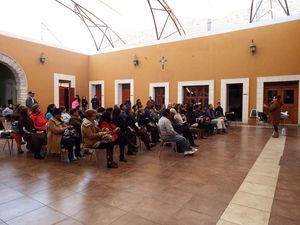
The "Fray Juan de Larios" Diocesan Center for Human Rights, located in the city of Saltillo, Coahuila, was founded in 2002 by the Bishop Raul Vera. Since 2009, the Center has supported the families of disappeared persons, who later started identifying themselves as Fuundec. The process of counseling and comprehensive social defense that they have driven has allowed the families to empower themselves and to sit and talk to state and federal authorities in order to present their demands. In addition, they have worked, together with the Saltillo Migrant Shelter, for the realization of the rights of migrants that cross the state in their attempt to reach the United States. The Center also has an education and training area aimed at different sectors of the population.
PBI's accompaniment to the Fray Juan de Larios Diocesan Center for Human Rights was made official in early February 2014. See PBI Mexico's info sheet on the Center, as well as PBI Mexico's publication
The "Juan Gerardi" Human Rights Center began its work in 1999. It is located in Torreón, Coahuila, in the region known as La Laguna. The Center aims to promote the initiatives of individuals and organizations so they can be subject to the transformation of their own reality. These initiatives must be based in respect and peace with justice. Currently, the organization works in six areas: migrants, environmental defense (especially water), disappearances (collaborating with Fuundec), youth, communication, and education/training.
The center accompanies different organizations that are working in La Laguna, among them Fuundec, organized families in search of their disappeared relatives. In addition, they support the Day Center “A Step Towards Hope”, a day shelter for migrants in Torreón (founded in May 2011), and are active in environmental defense together with collectives such as Laguneros for Peace and Citizenship Lagunera for Human Rights (Ciladhac). Due to the nature of the work that they carry out, the organization has experienced several incidents, including a raid of their headquarters by security forces in 2012 and the theft of documentation from their offices in 2013.
PBI's accompaniment to the Juan Gerardi Human Rights Center was made official in early February 2014. See PBI Mexico's info sheet on the Center.
Pasta de Conchos Family Organization
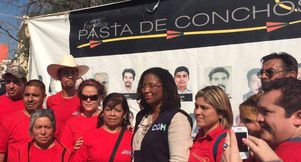
The Pasta de Conchos Family Organization has worked for over a decade in the Coal Mining Zone of the state of Coahuila, insisting that the bodies of 63 miners still trapped in the Pasta de Conchos mine be retrieved, while also demanding better safety conditions for miners who continue to work in the area.
PBI has accompanied the PCFO and Cristina Auerbach since 2014 through regular visits to the Coal Zone and by sharing international concern for the safety of the organization's members with state and federal authorities. Due to the heightened risk faced by Cristina Auerbach and the wave of smear campaigns directed at her in March of 2016, PBI released a public statement making the three levels of government aware of our deep concern for the situation. After PBI's activation, Front Line Defenders came out in support of Auerbach and published an Urgent Action. Likewise, PBI convened a meeting with representatives from 12 embassies to inform them on the situation.
See PBI Mexico's info sheet on Pasta de Conchos.
See here for other organizations in northern Mexico that PBI monitors for security purposes and occasionally supports.
